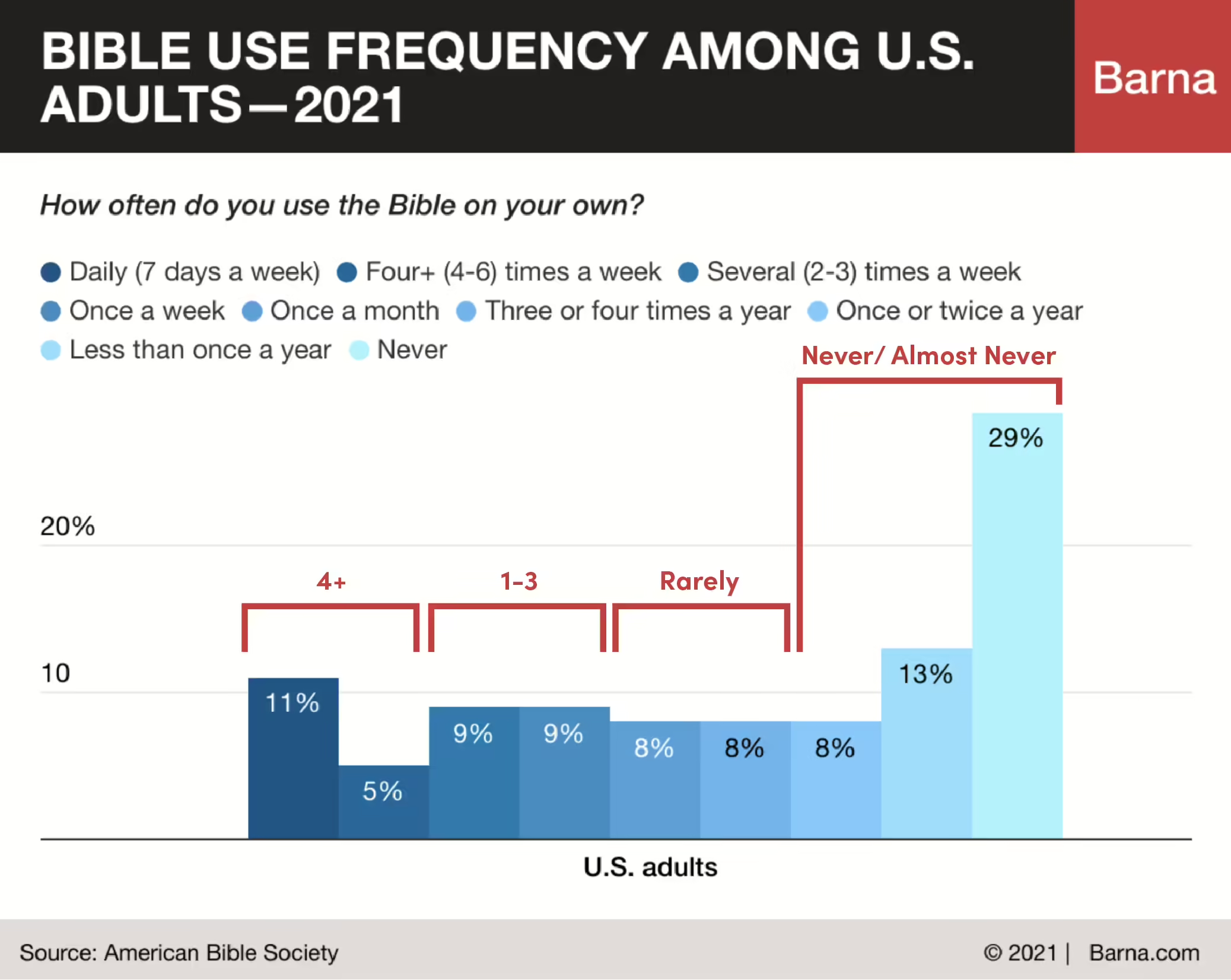
Engaging Daily with Scripture | Pastor Aaron Graham
Scripture
Acts 2:42-47
The early church was a learning church. In today’s fast-paced, hyper-distracted world, we often view spiritual experiences, emotional encounters, and vibrant charismatic expressions as a counter to intellectual engagement. Some may even believe that being filled with the Spirit and experiencing powerful moments of worship means that we should shy away from theology, Bible study, or doctrinal discussions. But the truth is, a Spirit-filled life draws us deeper into God’s Word. If we want to experience the fullness of the Holy Spirit and God’s presence in our lives, we must devote ourselves to Scripture.
We live in a time when accessing the Bible has never been easier. From apps to websites, devotionals, and podcasts, the Bible is more accessible than ever before. Yet, despite this unprecedented access, the real challenge is not availability—it’s engagement. Let’s explore why engaging with Scripture regularly is so important and what research shows about the benefits it brings.
Unprecedented Access to the Bible
In today’s digital world, accessing the Bible has become easier than ever before. Tools such as the YouVersion Bible App and online resources like The Bible Project and The Bible Recap provide numerous ways to engage with Scripture. The YouVersion Bible App, for example, offers a wide array of features, including the ability to highlight passages, compare different translations, join Bible study groups, and share verses with friends. This app alone has been downloaded over 715 million times globally, proving the widespread availability of the Word.
If you’re looking for visual aids, The Bible Project offers short, animated videos that present theologically sound teachings to help you navigate through the books of the Bible. Tara-Leigh Cobble’s Bible Recap is another incredible tool—it’s a daily reading plan paired with an 8-10 minute podcast episode that summarizes the day’s readings. With resources like these, you can study the Bible anywhere, at any time, on any device.
We even have the Museum of the Bible, the largest of its kind, located in Washington, D.C. Yet despite all this, our challenge isn’t accessing the Bible, but making it a priority amidst the noise of everyday life.
Information Overload: A Modern Challenge
Today, the average person processes more information in one day than someone in the 1920s might have processed in an entire year. With the constant barrage of notifications, social media posts, and endless news cycles, our brains are inundated with data—approximately 74 gigabytes per day. This is equivalent to watching 16 full-length movies in one sitting. Author Nicholas Carr, in his book The Shallows: What the Internet is Doing to Our Brains, explores how this flood of information is rewiring our brains, making it harder to think deeply and engage meaningfully with content. Instead, we become shallow thinkers, skimming rather than truly processing.
This overwhelming data consumption not only affects our daily lives but also impacts our ability to engage deeply with the Bible. Many of us find ourselves distracted, unable to focus long enough to delve into Scripture. It’s a challenge to prioritize God’s Word over the endless stream of other content we encounter every day. As a result, Bible engagement in America remains low, despite the Bible being the best-selling book of all time.
The Bible Engagement Gap
While the Bible sells more copies than any other book each year, only 16% of Americans report reading it regularly. The Barna Group found that half of U.S. adults never or almost never engage with Scripture. Only 16% of Americans engage with Scripture four or more times per week, a percentage that research shows is key to spiritual growth.

One study, conducted by the Center for Bible Engagement, highlights what they call the “Power of 4 Effect.” This study found that people who engage with the Bible four or more times a week see a dramatic difference in their lives compared to those who don’t. Here’s what they discovered:
- 228% more likely to share their faith with others
- 407% more likely to memorize Scripture
- 59% less likely to view pornography
- 30% less likely to struggle with loneliness
This means that engaging with the Bible at least four times a week significantly impacts our spiritual health, moral choices, and emotional well-being. On the flip side, those who engage with Scripture less frequently—just one to three times per week—show little difference from those who don’t read the Bible at all. The tipping point is clear: regular and frequent engagement with God’s Word leads to transformative change.
Practical Tips for Engaging with Scripture
If you’re feeling convicted about your Bible reading habits, you’re not alone. The good news is that with so many resources available, it’s easier than ever to begin developing a regular rhythm of Bible engagement. Here are some practical tips to help you start:
- Do it in community: One of the best ways to stay accountable in reading Scripture is to do it with others. Start a Bible reading plan, such as a “Bible in a Year” plan, and invite friends or family members to join you. Sharing insights and reflections keeps you motivated.
- Set a specific time and place: It seems that 90% of Christians who read the Bible regularly do so first thing in the morning. Establish a routine—whether it’s early morning, during lunch breaks, or before bed—and stick to it.
- Start with Psalms or the Gospels: If you’re new to regular Bible reading, begin with more accessible books like Psalms or the Gospels. These books offer encouragement, clarity, and insight that’s easier to grasp than some of the more complex sections of Scripture.
- Use technology: Take advantage of Bible apps that offer audio features. Listening to Scripture during your commute, while exercising, or while completing daily tasks can help you stay immersed in God’s Word.
Spirit-Filled Churches Are Bible-Believing Churches
In the early church, one of the first signs of the Holy Spirit’s presence was their devotion to the apostles’ teaching. Acts 2:42-43 describes how the early believers “devoted themselves to the apostles’ teaching” and were filled with awe as they witnessed many signs and wonders. A Spirit-filled church isn’t just about emotional experiences and miracles; it’s about being rooted in the truth of God’s Word.
John Stott writes, “One might perhaps say that the Holy Spirit opened a school in Jerusalem that day; its teachers were the apostles whom Jesus had appointed, and there were 3,000 pupils in kindergarten.”
The early church didn’t see theology and Bible study as optional—they craved knowledge about the life and teachings of Jesus from those who had spent the most time with him – the apostles. They also understood that being full of the Spirit meant being hungry for the truth found in Scripture.
The Importance of Standing Firm in Scripture
At The District Church, we believe in the authority of Scripture. We believe that the Bible is the inspired Word of God—accurate, complete, and without error. In a world where subjective truth reigns, we must stand firm in the objective truth of God’s Word.
Jesus himself emphasized the importance of holding onto his teachings. In John 8:31-32, He says, “If you hold to my teaching, you are really my disciples. Then you will know the truth, and the truth will set you free.” This freedom comes from a deep and abiding relationship with Scripture, one that shapes every aspect of our lives.
Conclusion: A Call to Consistent Bible Engagement
In a world filled with distractions, deep engagement with Scripture has never been more important. Regular, meaningful interaction with God’s Word has the power to transform lives. The research is clear—those who engage with Scripture four or more times a week are spiritually stronger, emotionally healthier, and morally more resilient.
If we want to see personal growth, lasting revival, and transformation in our communities, it starts with the Word of God. Let’s make a commitment to immerse ourselves in Scripture, to stand firm in the truth, and to encourage others to do the same.
